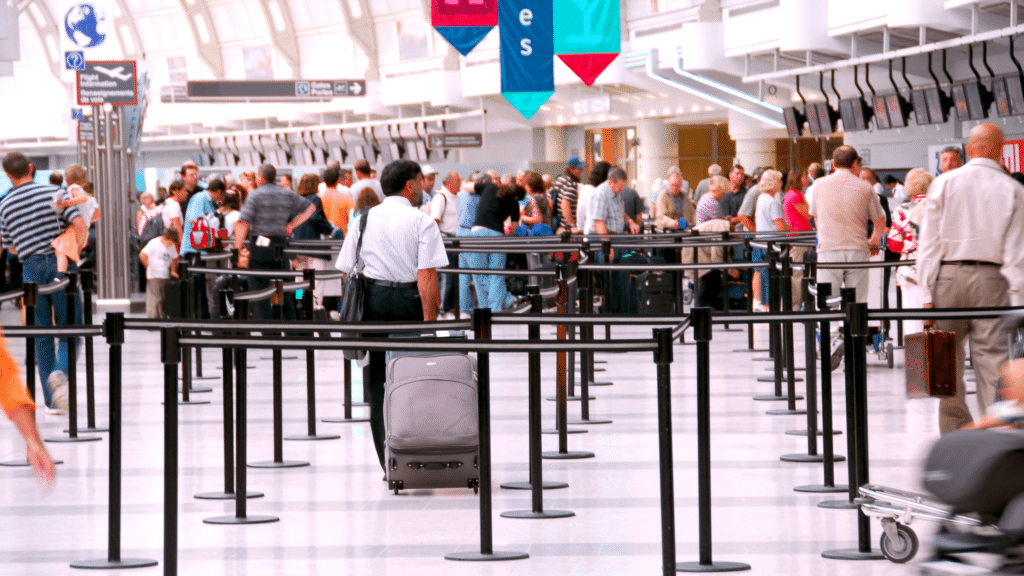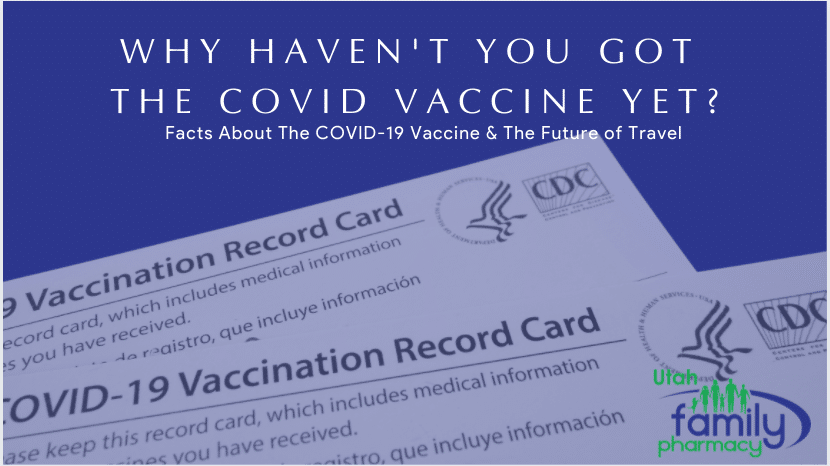As we’ve passed the one year mark of the COVID pandemic overtaking everything we know, there’s now multiple vaccines available that have been authorized for emergency use by the U.S. Food and Drug Administration (FDA).
With the number of citizens getting vaccinated slowly rising, if you’re not a part of that number, why haven’t you gotten the COVID vaccine yet?
Let’s go over what may be keeping you from receiving the COVID vaccine and what finally getting it could mean for you and the rest of the world. As it is a personal choice, at Utah Family Pharmacy we want to help you make a well educated decision.
Why People Aren’t Getting the COVID Vaccine
Since multiple vaccines have become available to the public, there have been a large amount of the population who are eligible to receive one (currently at Utah Family Pharmacy, citizens aged 12 years and up are eligible to make a vaccine appointment), or signed up to get one according to the Kaiser Family Foundation COVID-19 Vaccine Monitor, a research project tracking the public’s attitudes and experiences with COVID-19 vaccinations.
Though it’s important to know that not everybody eligible has received one.
Thirteen percent of U.S. adults say they will “definitely not” get a vaccination for COVID-19, according to the Kaiser vaccine monitor.
Some of the main reasons for hesitance to be vaccinated truly vary, but the most common being that it’s “too new” for people to feel comfortable enough to receive it. As they believe there isn’t currently enough information about them, or the long-term effects.
Following the top reason, come the next three more common reasons:
- Some don’t think the vaccine is even effective.
- Others believe they’re fine without it.
- Lastly, some state they don’t know what’s in it.
Some other found reasons that citizens are against getting the COVID vaccine include worry about side effects, not liking vaccinations in general, or believing they aren’t capable of contracting COVID-19.
So, why haven’t you gotten the COVID vaccine? It’s good to know that the number of adults in the U.S. who are already vaccinated, or are planning to be is on the rise at a current rate of 62%.
Vaccinations Required to Travel

Currently, the United States is one of the countries not requiring people to be vaccinated against the COVID-19 virus before entering the country. This is regardless of whether you’re visiting, or are a current U.S. resident. (This is according to the Centers for Disease Control and Prevention).
The CDC is adding that those who are fully vaccinated no longer need to be tested before they leave the U.S., but that’s not including places that still require it. They also no longer need to self-quarantine after re-entering the U.S., but should have a negative COVID test before boarding a flight back.
Those who are vaccinated may also travel domestically without needing to receive a COVID test, or self-quarantine.
The Biden administration will not issue a federal vaccine mandate, as announced in a press briefing on March 29. Instead, it will leave that up to the private sector.
For example: American Queen Steamboat Co. will require all crew and guests to be vaccinated, starting July 1. Crystal Cruises also will not accept any unvaccinated passengers, age not being a deciding factor.
Countries and their COVID Vaccine Requirements

Currently, Japan, China and the European Union are moving toward vaccine credentials making it easier for those who have gotten the COVID vaccine to travel. In the near future travelers who are vaccinated, or who have already had COVID-19 will be exempt from any travel restrictions in Iceland.
Countries that will open their borders to travelers who are vaccinated include:
- Ecuador
- Georgia
- Guatemala
- Slovenia
- Estonia
“Airlines don’t mandate vaccines. But they must abide by government-ordered vaccination requirements. Airlines can be fined if they don’t ensure that their passengers are legal to travel, and comply with border entry requirements. More than 100 countries currently require a negative COVID-19 test as a condition of entry.” Said by Perry Flint, a spokesperson for the International Air Transport Association.
If you’re one of those who are generally just against getting a vaccine, or those who don’t want to get the COVID vaccine for political reasons, or because they don’t trust the vaccine are not legally protected from any vaccine mandates.
Protect Yourself From the New Strain of COVID
In December of 2020, a news media put out reports of a new COVID virus variant that causes COVID-19. After that, there have been other variants identified and are currently under investigation.
These new variants are bringing up new questions surrounding the COVID vaccine and virus, such as:
- Are people more at risk for getting sick?
- Will the COVID-19 vaccines still work?
- Are there new or different things you should do now to keep your family safe?
The Delta COVID Variant
There’s currently a highly transmissible delta coronavirus variant that is actively devastating India and spreading quickly to other nations. Health experts are urging the importance, now more than ever, of getting the COVID vaccine.
This delta variant was first found in India and is more contagious, spreads at a more rapid rate and is currently the more dominant strain of the COVID virus in the U.K.
A study was performed in the U.K. and cited by the Biden administration, which found that one dose of the Pfizer vaccine will provide almost 33% protection against the delta variant, officially known as B.1.617.2.
However, two doses of the Pfizer vaccine provides about 88% protection against the delta variant.
“If you’ve gotten your first dose, make sure to get that second dose,” Anthony Fauci, MD, White House medical advisor, said.
Dr. Fauci also noted that the delta variant accounts for about 6% of new U.S. cases. That number could be higher, however, as the U.S. system for tracking coronavirus variants is lacking. “For those who have not been vaccinated, please get vaccinated.”
Get Vaccinated at Utah Family Pharmacy
Now if you’re not currently vaccinated, why haven’t you gotten the COVID vaccine? We hope that we’ve cleared up the importance of making the right decision and deciding to schedule your first appointment!
We also want to remind you to continue washing your hands frequently and if you’re not currently vaccinated, continue to wear your face covering in public and practice physical distancing.
Currently, ages 12 and up are eligible for the Pfizer and Moderna COVID vaccines. When you become eligible you can easily schedule your first and second doses on our website.
Two weeks following your last dose of the vaccine, you’ll be protected against the serious symptoms of the COVID-19 virus. Stay safe, stay informed, and contact us with any questions you may have regarding receiving the COVID vaccine.


Recent Comments